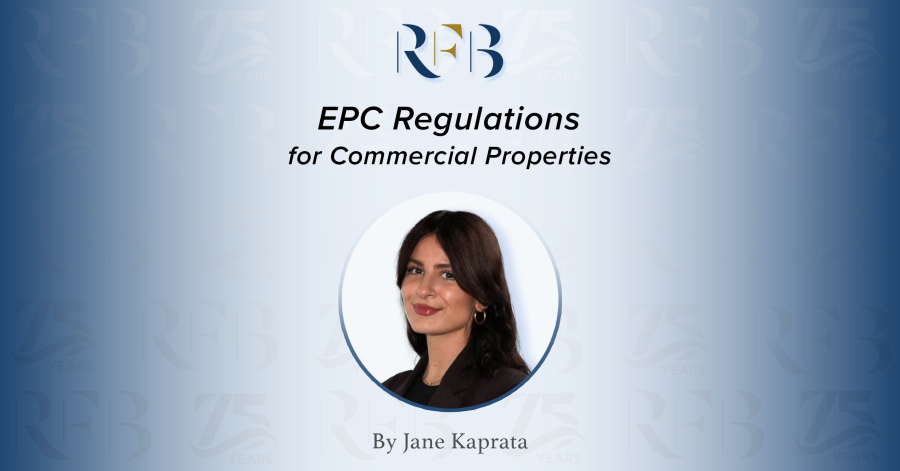Starting from 1st April 2023, in accordance with government proposals, all leased commercial properties are required to maintain an Energy Performance Certificate (EPC) rating of E or above. Failure to meet this standard may subject property owners and landlords to sanctions under the Minimum Energy Efficiency Standard Regulations (MEES).
Minimum EPC Rating and Future Standards
By 2027, the EPC standard is set to rise to C, with the minimum requirement increasing to B by 2030. Currently, Minimum Energy Efficiency Standards prevent landlords of commercial properties in England and Wales from granting new leases unless they have an EPC rating of E or higher.
Fines for EPC Standards Non-compliance
Non-compliance with these regulations could lead to various sanctions, including fines of up to £150,000 for serious breaches, as advised by the Royal Institution of Chartered Surveyors (RICS). These sanctions may also result in the publication of non-compliant landlords on the Private Rented Sector (PRS) Exemptions Register, causing reputational damage.
– Breaches of less than three months: A fine of 10% of the rateable value, ranging from £5,000 to £50,000.
– Breaches of more than three months: A fine of 20% of the rateable value, with a minimum of £10,000 and a maximum of £150,000.
EPC certificates are valid for ten years unless significant changes have been made to the property.
What are the Exemptions for EPC Ratings?
The UK government advised that landlords will not require an EPC if they are able to demonstrate that the building is any of the following:
– Listed or Officially Protected Buildings: The minimum energy performance requirements would unacceptably alter the structure.
– Temporary Buildings: Intended for use for two years or less.
– Places of Worship: Buildings used for religious activities.
– Low-Energy Properties: Industrial sites, workshops, or non-residential agricultural buildings with minimal energy usage.
– Small Detached Buildings: Structures with a total floor space under 50 square meters.
– Demolition Plans in Place: Buildings slated for demolition, with all necessary planning and conservation consents.
PRS Exemption Registration Requirements
In addition to the above exemptions, the new regulations shall also not be applicable if landlords are able to demonstrate the following:
– Cost-Effective Improvements: If improvements to the building are not cost-effective, and the rating remains below E.
– Market Value Impact: If improvements would devalue the property’s market value by more than 5%.
– Consent Challenges: If further consent is required, either from the local planning authority or a third party and has been refused for energy improvements.
– Six-Month Exemption for New Landlords: For those who have recently become landlords, a beneficial six-month exemption is granted upon purchasing a commercial property. This grace period allows landlords time to enhance the EPC rating.
Landlords must register the above exemptions on the PRS Exemptions Register.
The responsibility rests with the owner to demonstrate the exemption, and one should not presume that any conditions automatically apply. These exemptions hold validity for a duration of five years, and in the event of a property sale, the new owner does not inherit automatic exemption from the prescribed guidelines.
How can landlords meet the current EPC requirements (2024)?
Landlords can elevate their EPC ratings through the following methods:
– Insulation: This can be improved through cladding or refurbishment works which are costly, but the additional insultation will have a significant effect on the EPC rating.
– Windows, Glazing, and Wall & Roof Insulation: Improve your EPC rating by opting for double or triple glazing, combined with robust insulation for walls and roofs. Minimising heat loss plays a pivotal role in rating improvement.
– Lighting: Upgrade to LED or modern fluorescent lighting for improved efficiency.
– Energy-saving Heating Methods: An inefficient boiler or air-conditioning system can significantly impact your EPC rating. Replace old systems with modern, high-efficiency models to reduce consumption and costs.
To conclude…
Landlords must assess their property portfolios to ensure compliance with EPC requirements. If the exemptions are not applicable, seeking advice from a surveyor or building consultant is crucial for improving ratings.
EPCs are not merely legal obligations for UK commercial landlords; they also present opportunities to improve energy efficiency, property attractiveness, and value:
– Energy-efficient buildings cut utility costs, reducing the likelihood of breakdowns.
– Environmentally efficient properties may attract tenants willing to pay higher rent, resulting in higher returns or lower costs for greener properties.
– Ultimately, landlords can secure a higher overall revenue.
Contact Our Commercial Real Estate Solicitors
For more information or advice on Commercial Real Estate matters, contact Associate Solicitor Jane Kaprata on 020 8138 8129 or via email at j.kaprata@rfblegal.co.uk.
Additional Info
– News Author:Jane Kaprata
